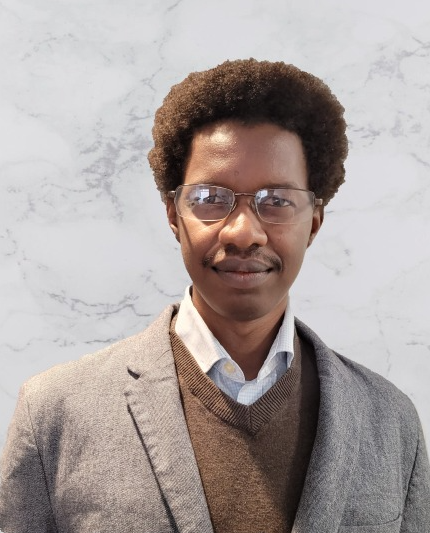“Mouhamadou Sy is a Mauritanian mathematician. After his high school diploma (baccalaureat) obtained at Lycée de Kaédi (Mauritania) in 2009, he pursued undergraduate and graduate studies at University of Cergy-Pontoise in France, where he completed a PhD in mathematics in 2017. He then was hired at University of Virginia as Research Associate in 2018. Three years later, in 2021, he joined Imperial College London as Research Associate in the team of Fields medalist Martin Hairer. After a position at Johns Hopkins University, he becomes the new holder of the German Research Chair at AIMS Senegal.
Sy’s research areas include the study of various classes of nonlinear partial differential equations, with a particular focus on the nonlinear Schrödinger equations and the Navier-Stokes dynamics, which are fundamental models in physics (plasma, optics, fluids) and have substantial real-life applications : weather and climate sciences, aerodynamic and hydrodynamic designs, flows in pipeline and in blood vessels, the study of pollution, optic fibers telecommunications etc.
His contributions include the development of new stochastic based techniques to build probabilistic solutions theories for such equations, especially in the context of energy supercritical regimes.
Mouhamadou Sy has also advocated for the scientific development of African languages, considering that a substantial improvement of science learning in Africa will be achieved by teaching sciences through children’s own languages and using their cultural references. On this line, he has published three books of mathematics in Pulaar/Fula and invited, during international gatherings, political and scientific actors to consider this long lasting issue in African education systems.
At AIMS Senegal, Sy aims to bring his expertise and dynamism to contribute to the development of mathematics in Africa by primarily conducting advanced research and training young researchers at, notably, PhD and postdoctoral levels. He will also initiate several collaborations with local and international researchers to organize scientific activities and trigger research projects whose impacts are expected to be beneficial to Africa at both academic and developmental levels. “

